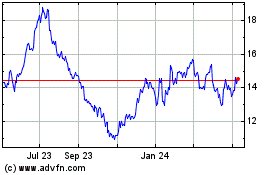Delta, American to Trim Capacity, Southwest CEO to Take Pay Cut--3rd Update
March 10 2020 - 11:42AM
Dow Jones News
By Alison Sider
Airlines on Tuesday detailed the growing impact of the
coronavirus by cutting more flights in domestic and international
markets, parking planes, freezing hiring and reducing executive
pay.
American Airlines Group Inc. and Delta Air Lines Inc. both said
they planned to reduce the number of flights across their networks.
United Airlines Holdings Inc. CEO Oscar Munoz and President Scott
Kirby said they would forgo their base salaries until at least June
30, and Southwest Airlines Co. CEO Gary Kelly told employees he
will take a 10% pay cut as the airlines face the most severe
downturn in decades because of the spread of the coronavirus.
The moves come as bookings have dropped off amid growing
passenger fears about traveling. Airlines are now preparing for the
prospect that recovery could take months, rather than the quick
bounceback many had initially anticipated when the virus started to
affect travel early this year. The virus's rapid impact on demand
has sent airlines reeling: American, Delta and United have all
withdrawn their financial guidance for the year and suspended share
buyback programs, among other measures.
American said it plans to cut domestic flying by 7.5% by
decreasing frequencies in markets where it operates many flights.
It will reduce international flying by 10% for the summer peak
travel season.
Delta said Tuesday that it will park some planes and reduce
capacity across its network, cutting international capacity as much
as 25%, and domestic capacity as much as 15%. Delta also said it
would freeze hiring and offer voluntary leave options, in addition
to deferring $500 million in capital expenditures and said it would
consider retiring some planes early.
"This is a fear event," Delta CEO Ed Bastian said, speaking at
an industry conference that was webcast, rather than being held
live, on Tuesday. Mr. Bastian said he expects demand will continue
to erode in the near term.
Overseas, the European Commission is close to approving a
suspension of airport-slot rules that would allow airlines to cut
back capacity without risking the loss of lucrative takeoff and
landing rights, according to people familiar with the matter.
The move, which could be signed off as early as Tuesday
afternoon, would provide significant relief for domestic and
international carriers operating in Europe. Some have been
operating near-empty flights in and out of congested hubs, like
London's Heathrow, to retain the slots.
Under the "use-it-or-lose-it" airport slot rules, airlines must
use a takeoff or landing slot at a level of at least 80% to keep
the flying rights for the next season.
United said it now expected to incur a first-quarter loss,
rather than the profits it had anticipated. The airline said it
raised $2 billion from a group of banks, which will bring its total
liquidity to $8 billion. The airline is also slashing capital
spending by $2.5 billion.
Southwest's Mr. Kelly told employees that the virus has created
a challenge more serious than any the industry has faced since
9/11, "and it may be worse."
"The velocity and the severity of the decline is breathtaking,"
Mr. Kelly said in a video message Monday that was viewed by The
Wall Street Journal. "There is no question this is a severe
recession for our industry and for us, and it's a financial
crisis." Southwest had previously said the reduced bookings could
result in as much as $300 million in lost revenue in March
alone.
The virus is testing airlines' ability to weather the kind of
economic crisis they have promised investors they could withstand
following a decadelong run of industry profits. While a sharp drop
in fuel prices is likely to relieve some pressure, carriers are
facing a global-demand shock that looks to be more severe than
anything they have encountered since 9/11.
American CEO Doug Parker said corporate travelers have shown the
steepest declines in demand, as companies have told employees to
stay put. The airline saw a "large increase" in bookings when it
opened up more seats at cheaper prices, he said.
American's reduction in domestic flights will include
cancellation of routes where customers can be easily rerouted. Some
domestic routes will get a boost, though, with bigger planes that
would have been used for international flying.
Internationally, the airline will hold off on flying to mainland
China until late October, and will extend cancellations to Hong
Kong and Singapore for months. It is temporarily suspending or
cutting back on service to European destinations including
Barcelona, Madrid, Rome and Paris. Latin America, which had been
the one relative haven for U.S. airlines' international operations,
will also see cuts, including American's flights to Chile, Uruguay,
and Brazil.
United said Tuesday that it expects the schedule reductions it
has already announced will be rolled forward.
All three airlines said fuel savings could be a silver lining
due to the oil-price rout. American pegged the cost reduction at as
much as $3 billion in a presentation prepared for Tuesday's
conference.
European carriers stepped up their own cancellations after Italy
shut down travel in and out of the country. Ryanair Holdings PLC
revised down its traffic plans for this year by three million
passengers to 151 million, while Norwegian Air Shuttle ASA said it
would cut 3,000 flights from its schedule.
--Benjamin Katz and Doug Cameron contributed to this
article.
Write to Alison Sider at alison.sider@wsj.com
(END) Dow Jones Newswires
March 10, 2020 11:27 ET (15:27 GMT)
Copyright (c) 2020 Dow Jones & Company, Inc.
American Airlines (NASDAQ:AAL)
Historical Stock Chart
From Mar 2024 to Apr 2024

American Airlines (NASDAQ:AAL)
Historical Stock Chart
From Apr 2023 to Apr 2024
